

On Oct. 25, California State University, San Bernardino (CSUSB) hosted the Cyber Ecosystem Leadership Forum, bringing together more than 250 attendees from academia, industry and government – each focused on a shared mission: developing a workforce prepared to meet the demands of an ever-evolving cyber landscape that currently has 500,000 open cyber jobs nationally and 1,392 open cyber jobs here in the San Bernardino area.
CSUSB President Tomás D. Morales opened the event, welcoming attendees and emphasizing the university's leadership in shaping educational pathways that drive economic mobility. "We are extremely proud to serve as a leader in cyber education, not just locally or regionally, but nationally," Morales said. "CSUSB stepped forward when our government challenged academia to help solve the national cyber workforce crisis. Through strategic partnerships, we are developing educational pathways that meet the needs of the workforce while empowering our students to pursue meaningful careers."
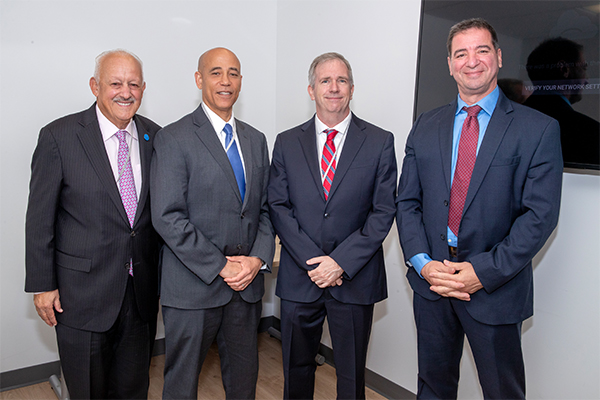
U.S. Representative Pete Aguilar (CA-33), White House Deputy National Cyber Director Harry Wingo, and Principal Director Diba Hadi from the Department of Defense’s Cyber Academic Engagement Office delivered keynote addresses, highlighting the collaboration between CSUSB and the federal government. Their speeches emphasized how this partnership is addressing critical cyber workforce challenges while expanding opportunities in underserved communities.
“We must continue to ensure the Hispanic community has the access and tools they need to join America’s cyber workforce,” said Wingo. “I’m fortunate to be speaking at a university that is leading in cyber education. Cal State San Bernardino is developing a new generation of cyber students. These students will be ready to tackle emerging technologies that are shaping our world – through cyber and AI today and quantum tomorrow.”
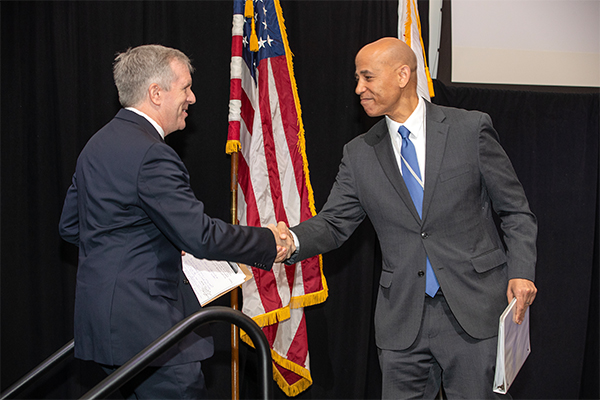
Aguilar built on the theme of the importance of preparing underrepresented communities to thrive in the cyber sector, emphasizing the Inland Empire’s growing influence in developing a workforce for national security roles.
“The Department of Defense is asking for a robust cyber workforce to meet one of our country’s most pressing challenges, and I’m proud to say that the Inland Empire is answering the call,” said Aguilar. “Cal State San Bernardino is working closely with the federal government to build a pipeline that connects students to national security jobs. When we invest in industries like cybersecurity, we’re investing in a brighter future for our young people."
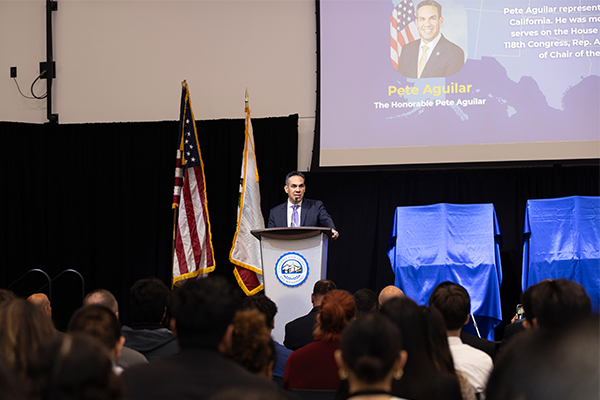
In her address, Dr. Hadi referred to the Center for Academic Excellence (CAE) community and the respect the community has for Dr. Tony Coulson and Dr. Vincent Nestler, director of CSUSB’s Center for Cyber and AI. “I was told by the CAE community that [Dr. Coulson and Dr. Nestler] are the brainchild of the CAE (cybersecurity) program. If you want anything done, you talk to Tony, Vinny and their team. And that has proven to be true,” said Dr. Hadi.
During his address, Dr. Tony Coulson, executive director of CSUSB’s Center for Cyber and AI, reflected on the university's early involvement in building solutions.
“When the government said, ‘We need help,’ we said, ‘Hey, here’s some things that we’re doing, let’s share it with everybody,’” said Dr. Coulson. “To quote Ronald Reagan, ‘A person can accomplish great things as long as they don’t care who gets the credit.’ And that was our founding principle on how we were going to move forward and solve this problem.”
Of his involvement with the CAE community, Dr. Coulson said, “We were fortunate enough to work with some great federal sponsors within the NSA. We helped grow the community of the Centers for Academic Excellence schools – it was only universities at the beginning – to include community colleges and grow it from 100 institutions to 485 institutions that focus on research and defense.”
Following the keynote presentations, a ribbon-cutting ceremony celebrated two significant milestones for the university: the renaming of CSUSB’s Center for Cyber and AI and the launch of California’s first School of Cyber and Decision Sciences. These initiatives are designed to prepare students for dynamic careers in cybersecurity, artificial intelligence and data science.
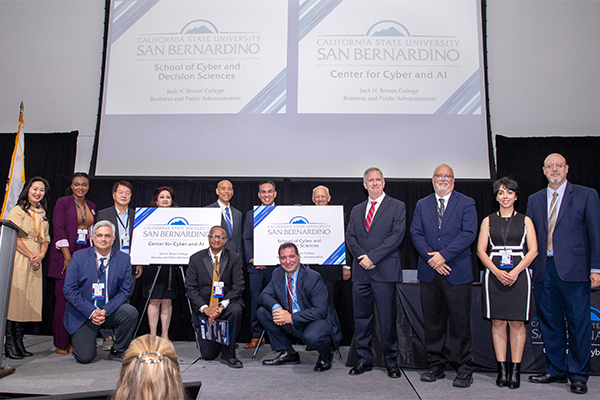
The morning panel discussions expanded on the keynote themes, delving into innovative strategies for workforce development and addressing the challenges of meeting employer needs. Experts from academia, industry and government shared best practices for engaging youth in cyber education, cultivating regional apprenticeships, and creating seamless pathways from K-12 to higher education. Dr. Vincent Nestler, principal investigator from CSUSB’s Center for Cyber and AI, joined representatives from the Naval Surface Warfare Center, Pacific Northwest National Labs, and private sector Inland Empire technology companies offered valuable insights on aligning educational programs with the evolving needs of industry. The discussions underscored the importance of regional partnerships in bridging workforce gaps and demonstrated how CSUSB’s initiatives serve as a model for national adoption.
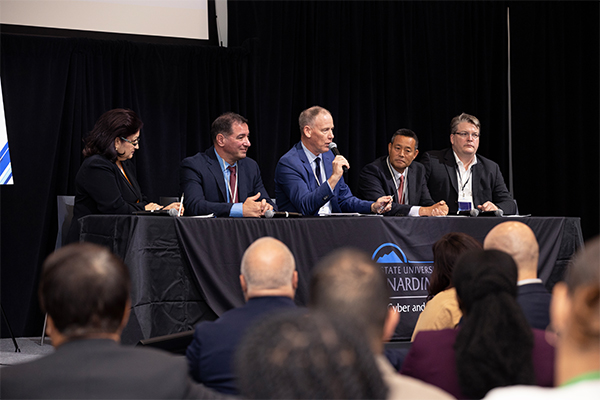
The breakout sessions that followed provided participants with opportunities to explore emerging trends and career pathways in artificial intelligence and cybersecurity. Attendees engaged with expanded cyber ranges, connected with experts on the future of AI and cybersecurity, and explored booths showcasing opportunities at the regional, state and national levels.
The forum provided a platform for key announcements that will shape the future of cybersecurity education and workforce development. These initiatives underscore CSUSB’s commitment to producing career-ready graduates capable of making a meaningful impact in their communities.
Among the key initiatives introduced:
- Cyber Education and Career Explorer Map: Led by CSUSB, the CAE Community will introduce a national interactive map that connects users with cyber programs, designated as Centers of Academic Excellence, which offer certificates, associates, bachelor's, and postgraduate degrees. With the potential to serve millions of prospective students, including those from minority-serving institutions, this tool links 430 higher education institutions with regional job opportunities, creating a bridge between education and workforce needs.
- Cyber Workforce Tech Hub Launch: Located within CSUSB’s Center for Cyber and AI, this hub will expand workforce opportunities in the Inland Empire, focusing on artificial intelligence, security operations, and space technology, while providing access to cutting-edge broadband infrastructure for advanced tech training. Key partners in this initiative include LAUNCH, Tomorrow’s Talent and NXL Cyber. Supported by federal grant funding, the hub will feature a security operations center, offering essential job training to hundreds of students and safeguarding the region and educational institutions by identifying and mitigating cyber risks.
- CSUSB Educational Agreement with U.S. Navy: Announcement of a new cyber research and educational agreement between CSUSB and the U.S. Naval Surface Warfare Port Hueneme Division, providing critical skills, workforce, and research for the Navy.
- The Inland Empire Leads California in Cybersecurity Apprenticeships: Funded by the National Centers of Academic Excellence Program and the California Department of Apprenticeship Standards, this pioneering initiative offers cyber apprenticeships from high school through bachelor’s degree programs. New employer partners—Loma Linda University Medical, San Manuel Band of Mission Indians, City of Moreno Valley, and County of Riverside—will collaborate with CSUSB, Moreno Valley College, and Riverside City College to place hundreds of apprentices across the region over the next two years.
- Free Skills-Based Assessments for Students Nationwide Through Upgraded New Experience Cyber (XPCyber) Range: Aligned with both the NICE and DoD Cyber Workforce frameworks, this enhanced system is accessible to over 700 colleges, universities and high schools, with the capacity to support hundreds of thousands of students over the next five years. Key partners include NCAE, CISA, DoD CIO, NXL Cyber and Microsoft, ensuring robust support and industry alignment. To learn more, visit the XP Cyber website.
- TRY CYBER: A Free Web Application for Exploring Cyber Careers: TRY CYBER helps users discover cyber career paths through 15-minute, hands-on micro-challenges that simulate a first-day internship in one of ten NICE Framework-aligned roles, guided by a virtual mentor. Developed in partnership with the Cybersecurity and Infrastructure Security Agency (CISA), the platform offers an immersive way to experience real-world tasks and envision future opportunities within the dynamic field of cybersecurity. For more information, visit the TRY CYBER website.
- Workforce Innovation Tech Hubs (WITH-Cyber) Initiative: The WITH-Cyber initiative will establish a statewide cyber workforce educational ecosystem within California. Designed to meet the state’s growing demand for skilled cyber professionals, this comprehensive program leverages collaborative workforce development ecosystems. Anchored by the 23-campus California State University (CSU) System — the largest public university system in the world — and led by Cal State San Bernardino, WITH-Cyber will connect K-12 schools, community colleges, and universities through regional hubs to build workforce pipelines and develop local initiatives. This four-year, $4 million project aims to provide educational resources to over 50,000 students across the state. To learn more, visit the WITH-Cyber website.
- Introduction of California’s First School of Cyber and Decision Sciences: CSUSB announced the launch of the state’s first School of Cyber and Decision Sciences, which is housed within CSUSB’s Jack H. Brown College of Business and Public Administration. This innovative school integrates cybersecurity, business and data analytics, supply chain management, and applied AI into flexible, interdisciplinary programs at both the undergraduate and master’s levels. The school offers four specialized degrees in cyber and business analytics, intelligence, and related fields, with interdisciplinary connections to business, criminal justice, public administration, and national security studies.
- Center for Cyber and AI (CyAI): CSUSB’s Center for Cyber and AI (formerly known as the nationally recognized CSUSB Cybersecurity Center) will advance local and national workforce development in critical fields like cybersecurity and artificial intelligence. At its core is the Workforce Tech Hub, designed to create high-tech apprenticeship programs with industry partners and develop skills that contribute to the expansion of the national workforce. Projects underway include virtual reality, robotics, and AI applications integrated with important sectors, such as water, power, and national security. Through partnerships with community colleges and CTE programs, the center aims to accelerate workforce readiness and promote social mobility for aspiring tech professionals. To learn more, visit the Center for Cyber and AI website.
The Cyber Ecosystem Leadership Forum showcased how CSUSB’s cybersecurity and artificial intelligence education, combined with innovative partnerships, are setting a new standard in workforce development. Through groundbreaking regional, state and national collaborations, CSUSB is building the foundation for a high-quality cyber workforce poised to lead the next generation. These efforts will ensure that students are equipped with cutting-edge skills and tools, empowering them to meet the evolving demands of a rapidly changing digital landscape and shaping the future of cybersecurity and AI on a national scale.
To view the readout about this event from the Office of the National Cyber Director (ONCD), visit the The White House website.